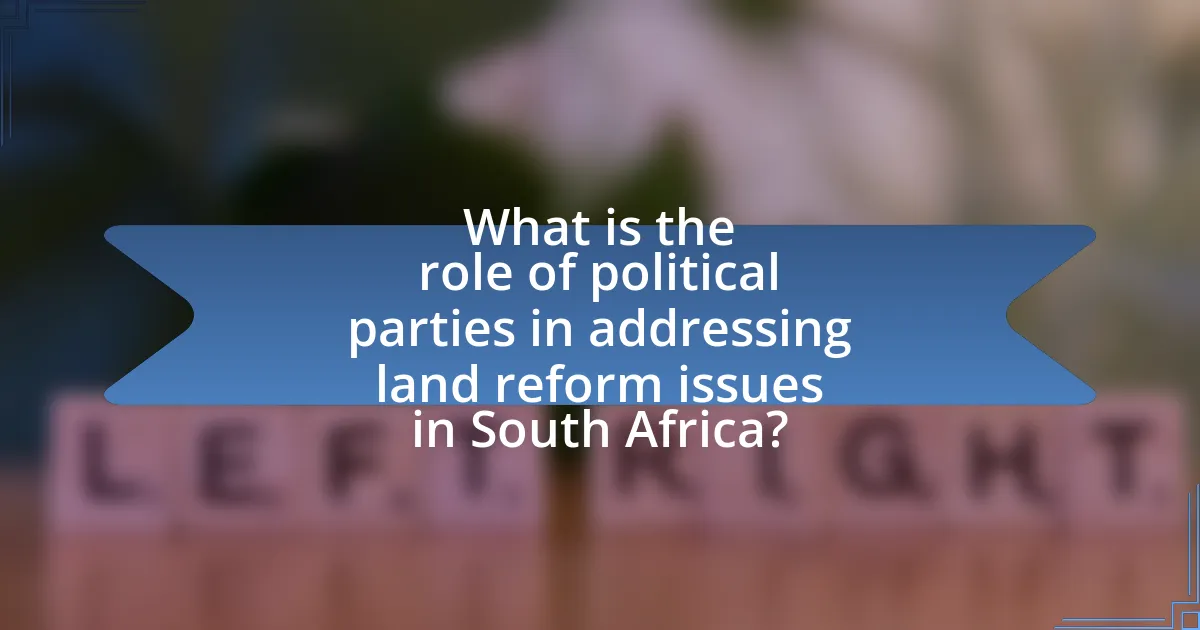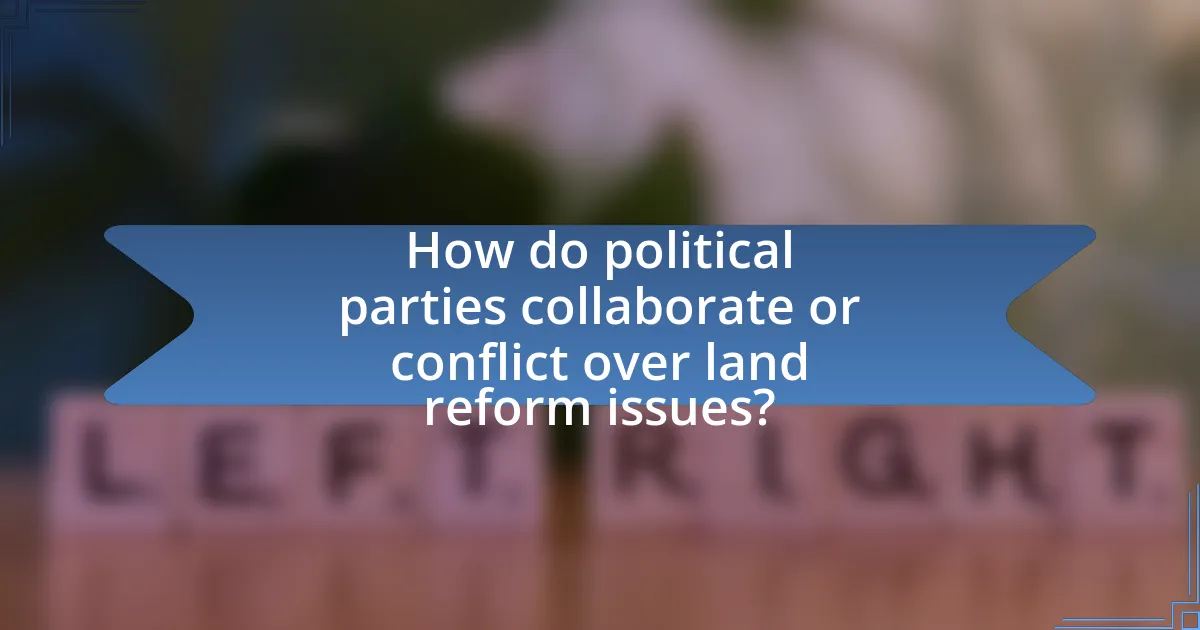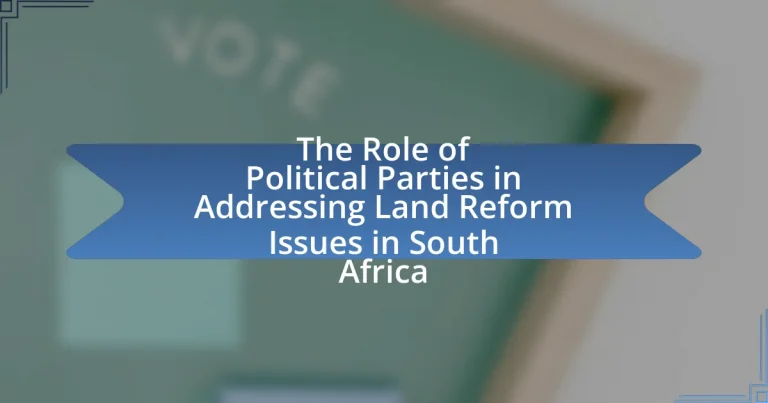The article examines the critical role of political parties in South Africa in addressing land reform issues, highlighting their influence on policy-making, legislation, and public opinion. It discusses the positions of key parties, including the African National Congress (ANC), Economic Freedom Fighters (EFF), and Democratic Alliance (DA), and how their ideologies shape their approaches to land redistribution. The article also explores the historical context of land ownership disparities, the challenges faced by political parties, and the implications of their actions on rural communities and social equity. Additionally, it outlines successful strategies and best practices for effective land reform, emphasizing the importance of stakeholder engagement and evidence-based policies.

What is the role of political parties in addressing land reform issues in South Africa?
Political parties in South Africa play a crucial role in addressing land reform issues by shaping policies, influencing legislation, and mobilizing public opinion. The African National Congress (ANC), for instance, has prioritized land redistribution as part of its post-apartheid agenda, aiming to rectify historical injustices. The Economic Freedom Fighters (EFF) advocate for expropriation of land without compensation, pushing for more radical reforms. These parties engage in parliamentary debates, propose bills, and participate in public consultations to address land ownership disparities. Their actions are guided by the need to balance economic growth with social equity, reflecting the diverse perspectives within South African society on land reform.
How do political parties influence land reform policies?
Political parties influence land reform policies by shaping legislative agendas, mobilizing public opinion, and negotiating power dynamics within government. For instance, in South Africa, the African National Congress (ANC) has prioritized land reform as a means to address historical injustices, leading to the introduction of policies aimed at redistributing land to previously disadvantaged communities. The ANC’s influence is evident in the 2018 amendment proposal to Section 25 of the Constitution, which sought to allow expropriation of land without compensation. This proposal was driven by the party’s commitment to land reform, reflecting its electoral promises and the demands of its support base. Additionally, opposition parties, such as the Economic Freedom Fighters (EFF), advocate for more radical land reform measures, further influencing the national discourse and policy direction. Their calls for immediate land redistribution without compensation have pressured the ruling party to consider more aggressive reforms, demonstrating how political parties can shape the landscape of land reform policies through their platforms and public engagement.
What are the key political parties involved in land reform in South Africa?
The key political parties involved in land reform in South Africa are the African National Congress (ANC), the Economic Freedom Fighters (EFF), and the Democratic Alliance (DA). The ANC has historically led land reform initiatives since the end of apartheid, aiming to redistribute land to address historical injustices. The EFF advocates for expropriation of land without compensation, emphasizing radical land reform as a means to achieve economic equality. The DA, while supporting land reform, promotes a market-driven approach and emphasizes property rights. These parties shape the national discourse on land reform through their policies and legislative proposals.
How do party ideologies shape their approach to land reform?
Party ideologies significantly influence their approach to land reform by determining their priorities and strategies for land redistribution. For instance, left-leaning parties, such as the African National Congress (ANC), advocate for extensive land reform to address historical injustices and promote social equity, often supporting state intervention and land expropriation without compensation. In contrast, right-leaning parties, like the Democratic Alliance (DA), emphasize property rights and market-driven solutions, advocating for voluntary land transfers and compensation to landowners. This ideological divide shapes legislative proposals, public discourse, and the implementation of land reform policies, reflecting broader socio-economic goals and historical contexts in South Africa.
Why is land reform a critical issue in South Africa?
Land reform is a critical issue in South Africa due to the historical injustices of land dispossession during apartheid, which resulted in significant racial inequalities in land ownership. Approximately 87% of agricultural land is owned by white South Africans, while the majority of the black population remains landless or under-resourced. This disparity fuels social tensions and economic disparities, making land reform essential for achieving equity and social justice. Furthermore, land reform is seen as a means to stimulate economic development and improve food security for marginalized communities, thereby addressing the legacy of apartheid and promoting national reconciliation.
What historical factors contribute to the current land reform debate?
The historical factors contributing to the current land reform debate in South Africa include the legacy of colonialism and apartheid, which established racially discriminatory land ownership patterns. The 1913 Natives Land Act restricted black South Africans to only 7% of the country’s land, a policy that entrenched economic disparities and social injustices. Following the end of apartheid in 1994, the government initiated land reform policies aimed at redistributing land to previously marginalized communities, yet progress has been slow and contentious. The failure to adequately address land restitution and redistribution has led to ongoing tensions and calls for more radical reforms, reflecting deep-seated grievances rooted in historical injustices.
How does land reform impact social and economic inequalities?
Land reform significantly reduces social and economic inequalities by redistributing land ownership from a small elite to a broader population. This redistribution allows previously marginalized groups, particularly in South Africa, to gain access to land, which is a critical asset for economic empowerment and social mobility. For instance, the South African government’s land reform policies aim to address historical injustices stemming from apartheid, where land was disproportionately owned by white individuals. According to the 2019 report by the South African Land Audit, approximately 72% of agricultural land is still owned by white farmers, highlighting the ongoing disparities. By implementing land reform, the government seeks to enhance food security, create jobs, and stimulate local economies, thereby fostering a more equitable society.
What challenges do political parties face in addressing land reform?
Political parties in South Africa face significant challenges in addressing land reform, primarily due to conflicting interests among stakeholders. These challenges include the need to balance the demands of land redistribution with the rights of existing landowners, which can lead to political backlash and social unrest. Additionally, political parties must navigate the complexities of historical injustices and the economic implications of land reform, as evidenced by the slow pace of policy implementation and the lack of consensus on effective strategies. The South African government has acknowledged these issues, as highlighted in the 2018 land reform policy framework, which emphasizes the need for a comprehensive approach to land redistribution that considers both economic viability and social equity.
How do internal party dynamics affect land reform initiatives?
Internal party dynamics significantly influence land reform initiatives by shaping policy priorities, resource allocation, and coalition-building efforts. For instance, factions within a political party may have differing views on land reform, leading to internal conflicts that can delay or dilute proposed reforms. In South Africa, the African National Congress (ANC) has experienced such dynamics, where differing opinions on land redistribution have resulted in inconsistent policy implementation. The party’s internal debates over the Economic Freedom Fighters’ radical land reform proposals versus more moderate approaches have created a complex landscape for land reform initiatives, impacting legislative progress and public trust.
What external pressures influence political parties’ land reform agendas?
External pressures that influence political parties’ land reform agendas include international economic factors, public opinion, and pressure from civil society organizations. International economic factors, such as trade agreements and foreign investment conditions, can compel political parties to adopt specific land reform policies to attract investment or comply with international standards. Public opinion, shaped by media coverage and grassroots movements, can push parties to prioritize land reform in their platforms to align with voter expectations. Additionally, civil society organizations advocate for land rights and equitable distribution, exerting pressure on political parties to address these issues in their agendas.

How do political parties collaborate or conflict over land reform issues?
Political parties in South Africa collaborate and conflict over land reform issues primarily through differing ideologies and policy proposals. The African National Congress (ANC) advocates for land redistribution to address historical injustices, while the Democratic Alliance (DA) emphasizes property rights and market-driven solutions. This ideological divide often leads to conflicts in parliamentary debates and public discourse, as seen during the 2018 parliamentary discussions on expropriation without compensation, where the ANC’s push for constitutional amendments faced strong opposition from the DA and other parties. Additionally, collaboration can occur when parties unite to support specific land reform initiatives that align with broader national interests, such as food security or economic development, but these instances are often overshadowed by their fundamental disagreements on the approach to land reform.
What are the mechanisms for collaboration among political parties on land reform?
Political parties in South Africa collaborate on land reform through mechanisms such as coalition agreements, joint task forces, and parliamentary committees. Coalition agreements allow parties to align their policies and strategies on land reform, fostering a unified approach. Joint task forces enable parties to work together on specific land reform initiatives, pooling resources and expertise to address complex issues. Parliamentary committees provide a platform for dialogue and negotiation, where representatives from different parties can discuss and refine land reform proposals, ensuring diverse perspectives are considered. These mechanisms facilitate cooperation and enhance the effectiveness of land reform efforts in South Africa.
How do coalitions impact land reform policy-making?
Coalitions significantly influence land reform policy-making by shaping legislative agendas and facilitating consensus among diverse political interests. In South Africa, coalitions often bring together parties with varying perspectives on land reform, which can lead to more comprehensive and inclusive policies. For instance, the coalition dynamics in the National Assembly can result in negotiations that address the concerns of both landowners and landless citizens, ultimately impacting the formulation of land reform laws. Historical examples, such as the 2018 land expropriation debate, illustrate how coalition politics can either advance or hinder reform efforts based on the alignment of interests among coalition partners.
What role do public consultations play in party collaboration?
Public consultations facilitate party collaboration by providing a platform for diverse stakeholder engagement, ensuring that multiple perspectives are considered in policy-making. This process enhances transparency and accountability, as parties can gather input from the public, which can lead to more informed and representative decisions. For instance, in South Africa’s land reform discussions, public consultations have allowed various political parties to align their strategies based on community feedback, fostering a collaborative environment aimed at addressing the complexities of land redistribution. This collaborative approach is crucial for building consensus and trust among parties, ultimately leading to more effective governance and policy outcomes.
What conflicts arise between political parties regarding land reform?
Conflicts between political parties regarding land reform in South Africa primarily revolve around differing ideologies and approaches to land redistribution. The African National Congress (ANC) advocates for land expropriation without compensation to address historical injustices, while the Democratic Alliance (DA) opposes this, arguing it could deter investment and economic growth. The Economic Freedom Fighters (EFF) further intensify the debate by pushing for radical land reforms that include nationalization of land. These conflicting positions create significant political tension, as parties debate the implications of land reform on economic stability, social equity, and historical redress. The tensions are evident in parliamentary debates and public discourse, reflecting deep divisions in how land reform should be implemented and its potential impact on South African society.
How do differing party platforms lead to legislative gridlock?
Differing party platforms lead to legislative gridlock by creating fundamental disagreements on policy priorities and approaches, which hinder the passage of legislation. In the context of South Africa’s land reform issues, the African National Congress (ANC) and the Economic Freedom Fighters (EFF) have contrasting views on land redistribution, with the ANC advocating for a more gradual approach while the EFF pushes for expropriation without compensation. This divergence results in an inability to reach consensus on critical reforms, as evidenced by stalled bills and failed negotiations in Parliament. Consequently, the lack of cooperation between parties exacerbates legislative inaction, preventing effective solutions to pressing land reform challenges.
What are the consequences of political conflicts on land reform outcomes?
Political conflicts significantly hinder land reform outcomes by creating instability and uncertainty in policy implementation. For instance, in South Africa, ongoing tensions between political parties have led to inconsistent land reform policies, delaying the redistribution of land and exacerbating inequalities. Research by the Institute for Poverty, Land and Agrarian Studies indicates that political infighting often results in a lack of coherent strategy, undermining efforts to address historical injustices related to land ownership. Consequently, these conflicts can perpetuate socio-economic disparities and hinder agricultural productivity, as land reform initiatives struggle to gain the necessary political support and public trust.
What are the implications of political parties’ actions on land reform in South Africa?
Political parties’ actions significantly influence land reform in South Africa by shaping policy direction and public discourse. The African National Congress (ANC), for instance, has prioritized land redistribution as a means to address historical injustices, leading to legislative efforts such as the Expropriation Bill, which aims to facilitate land acquisition without compensation. Conversely, the Economic Freedom Fighters (EFF) advocate for radical land expropriation without compensation, pushing the agenda further and creating a polarized political environment. These differing approaches impact public perception and investor confidence, as seen in the decline of agricultural investment due to uncertainty surrounding land ownership. Thus, political parties play a crucial role in determining the effectiveness and pace of land reform initiatives in South Africa.
How do political parties’ land reform policies affect rural communities?
Political parties’ land reform policies significantly impact rural communities by determining land ownership, access to resources, and economic opportunities. For instance, the African National Congress (ANC) has implemented policies aimed at redistributing land to address historical injustices, which can enhance food security and empower marginalized farmers. Conversely, the Democratic Alliance (DA) emphasizes property rights and market-driven reforms, which may prioritize existing landowners and limit access for the rural poor. Research indicates that effective land reform can lead to improved livelihoods; a study by the International Land Coalition found that equitable land distribution can increase agricultural productivity by up to 30%. Thus, the approach taken by political parties directly influences the socio-economic conditions of rural communities in South Africa.
What are the short-term impacts of land reform policies on farmers?
Short-term impacts of land reform policies on farmers include increased access to land, which can lead to improved agricultural productivity and income. Farmers who receive land through reform initiatives often experience a boost in their economic status as they gain the ability to cultivate crops and raise livestock on previously inaccessible land. For instance, a study by the South African Institute of Race Relations in 2019 indicated that beneficiaries of land reform programs reported a 30% increase in household income within the first year of receiving land. However, these policies can also lead to initial disruptions, such as uncertainty in land tenure and potential conflicts over land use, which may hinder immediate productivity gains.
How do these policies influence land ownership patterns?
Land reform policies in South Africa significantly influence land ownership patterns by redistributing land from historically advantaged groups to previously marginalized communities. These policies aim to rectify past injustices and promote equitable access to land, resulting in a shift in ownership demographics. For instance, the Restitution of Land Rights Act of 1994 has facilitated the return of land to black South Africans, altering the landscape of land ownership and increasing the proportion of land held by these communities. Additionally, the Expropriation Bill, which allows for land to be taken without compensation under certain conditions, further impacts ownership patterns by enabling the state to acquire land for redistribution, thereby challenging existing ownership structures.
What lessons can be learned from past political party actions on land reform?
Past political party actions on land reform in South Africa reveal critical lessons about the importance of inclusive policy-making and the need for clear communication with affected communities. For instance, the African National Congress (ANC) faced significant backlash for its slow implementation of land reform policies, highlighting the necessity for timely action to meet public expectations. Additionally, the land reform initiatives of the 1990s, which aimed to redistribute land to previously disadvantaged groups, often lacked adequate support systems, demonstrating that successful reform requires not only redistribution but also access to resources and training for beneficiaries. These historical examples underscore the need for political parties to engage with stakeholders and ensure that land reform policies are comprehensive and sustainable.
What successful strategies have emerged from political party initiatives?
Successful strategies that have emerged from political party initiatives in South Africa regarding land reform include collaborative policy development, community engagement, and targeted legislative reforms. Political parties have effectively collaborated with civil society organizations to create inclusive land reform policies that address historical injustices. For instance, the African National Congress (ANC) has implemented the Land Expropriation Bill, which aims to facilitate land redistribution while ensuring food security and economic stability. Additionally, parties have engaged local communities in discussions to understand their needs and priorities, leading to more effective and accepted land reform measures. These strategies have resulted in increased public support for land reform initiatives and a more equitable distribution of land resources.
How can political parties improve their approach to land reform in the future?
Political parties can improve their approach to land reform in the future by prioritizing inclusive stakeholder engagement and evidence-based policy development. Engaging with affected communities, agricultural experts, and land rights organizations ensures that reforms address the needs and rights of all stakeholders. For instance, the South African government’s 2018 land reform policy emphasized consultation with various groups, which led to more comprehensive and accepted solutions. Additionally, utilizing data and case studies from successful land reform initiatives, such as those in Rwanda, can guide effective policy-making. This evidence-based approach can enhance transparency and accountability, ultimately leading to more sustainable land reform outcomes.
What best practices can political parties adopt for effective land reform?
Political parties can adopt several best practices for effective land reform, including engaging in transparent stakeholder consultations, promoting equitable land distribution, and implementing evidence-based policies. Transparent stakeholder consultations ensure that the voices of affected communities are heard, fostering trust and collaboration. Promoting equitable land distribution addresses historical injustices and supports social cohesion, as seen in successful land reform initiatives in countries like Namibia, where land redistribution has been linked to improved social stability. Implementing evidence-based policies, supported by data and research, allows political parties to tailor land reform strategies to specific regional needs, enhancing their effectiveness.


